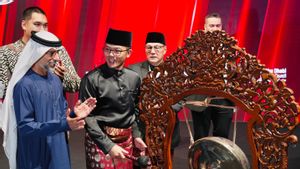YOGYAKARTA Honorary workers are non-State Civil Apparatus (non-ASN) workers. Currently, the central government and local government associations (Pemda) are designing the best alternative for the completion of non-ASN personnel arrangement.
Minister of State Apparatus Empowerment and Bureaucratic Reform (Menpan RB) Abdullah Azwar Anas together with governors, mayors, and regents, agreed to narrow down several alternatives to be formulated.
"We are detailing the best alternative, especially for non-ASN throughout Indonesia. And, starting to shrink there are several alternatives that will be formulated later," explained Minister Anas, a steering wheel from Antara.
Anas explained that the government has compiled several options that will later be submitted to the DPR. Several alternatives will soon be detailed with teams from provinces, regencies and cities.
Menpan RB stated that the central and regional governments collaborated to find the best alternative, without neglecting the humanitarian side and serving honorary staff. So, what is honorary staff?
Honorary power is a workforce that has not been appointed or has not been appointed as a permanent employee. Honorary staff can also be defined as a force that gets honorarium every month.
Based on Government Regulation Number 48 of 2005 concerning Appointment of Honorary Personnel to Candidates for Civil Servants, someone who is appointed by Civil Service Officers or other officials in the government to carry out certain tasks in government agencies or whose income is a burden on the State Revenue and Expenditure Budget or Regional Revenue and Expenditure Budget.
Honorary Power Status
The status of honorary workers is not permanent employees. Nevertheless, within the scope of government, honorary workers have a work agreement and will work in accordance with a decree from state administrative officials.
Honorary Tents of Energy
Due to his non-ASN status, the salary of honorary workers is the same as for private workers. As stated in the 2003 Manpower Act.
However, honorary workers usually get a small salary. Employees with honorary status only get a salary of around Rp. 500 thousand to Rp. 1 million. In some areas, even the salaries of honorary workers are only Rp. 300 thousand.
The determination of salaries for honorary workers is determined by the agency or supervisory officials who recruit workers based on budget allocations in the Work Unit. On the other hand, there is no special policy that regulates the amount of salary for honorary workers outside government agencies.
Different Honorary Energy and PPPK
As mentioned above, honorary staff is someone who is appointed by a staffing officer (PPK) or other officials in the government to carry out certain tasks from government agencies.
Meanwhile, Government Employees with Work Agreements (PPPK) are State Civil Apparatus (ASN) who are appointed based on Law Number 29 of 2018 concerning PPPK Management.
PPPK was appointed based on a work agreement for a certain period of time as the executor of government duties and positions.
Simply put, PPPK is a contract worker recruited by the government and assigned to carry out government duties and positions. For example, in ministries, public schools, public campuses, and so on.
This is information about honorary workers along with their status, salary and differences with PPPK. Keep in mind, honorary staff is someone who is appointed by the PPK to carry out certain tasks from government agencies.
The English, Chinese, Japanese, Arabic, and French versions are automatically generated by the AI. So there may still be inaccuracies in translating, please always see Indonesian as our main language. (system supported by DigitalSiber.id)













